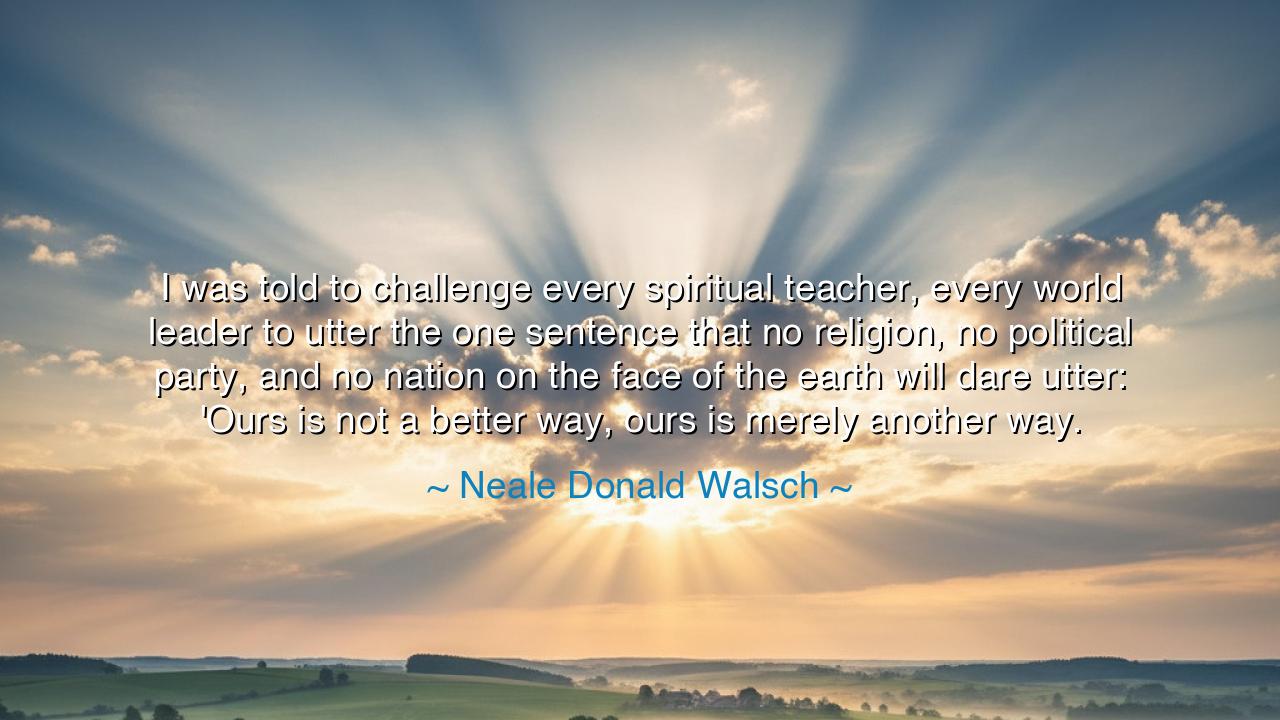
I was told to challenge every spiritual teacher, every world
I was told to challenge every spiritual teacher, every world leader to utter the one sentence that no religion, no political party, and no nation on the face of the earth will dare utter: 'Ours is not a better way, ours is merely another way.






The words of Neale Donald Walsch—“I was told to challenge every spiritual teacher, every world leader to utter the one sentence that no religion, no political party, and no nation on the face of the earth will dare utter: ‘Ours is not a better way, ours is merely another way’”—strike at the heart of human pride, division, and the illusions of superiority. Here lies a call for humility, a summons to recognize that no single path, doctrine, or authority holds the monopoly on truth. Walsch urges leaders and teachers alike to confront the hubris that elevates their way above others, and to embrace the radical equality of perspectives in matters of spirit, governance, and moral vision.
The meaning of this reflection is profound: the insistence on being “better” has fueled wars, persecution, and oppression throughout human history. Religions, political systems, and nations have all claimed supremacy, often justifying acts of violence and subjugation in the name of an alleged moral high ground. Walsch’s sentence challenges this arrogance. To admit that one path is merely “another way” is to honor the diversity of human experience, to recognize that wisdom, virtue, and enlightenment are not confined to a single creed or ideology.
History offers countless illustrations of the cost of failing to heed this insight. The Crusades, waged in the name of a single faith’s supremacy, brought untold suffering, destruction, and hatred across continents. Each side believed in the righteousness of its way, seeing others as heretics or enemies. The tragedy of these events reveals the danger of insisting on exclusivity, and the wisdom in Walsch’s call to humility: acknowledgment of other ways could have averted immense pain.
Even within the political realm, the same principle emerges. Mahatma Gandhi recognized that India’s path to independence need not imitate the methods of other nations, yet he did not claim that nonviolent resistance was universally superior. He sought dialogue and understanding, showing that different approaches can coexist, each reflecting the needs and wisdom of its people. To declare, as Walsch suggests, that one’s path is “merely another way” is to embrace this kind of generative pluralism, where respect replaces domination.
The lesson, O seekers, is that humility and openness are the foundations of true leadership and wisdom. To insist on superiority blinds us to the insights of others, narrows our vision, and perpetuates conflict. By acknowledging that no single path is absolute, we cultivate a spirit of empathy, dialogue, and creative cooperation. Walsch’s challenge reminds us that the greatest courage lies not in conquest, but in restraint, understanding, and the embrace of diversity.
Practically, this means cultivating awareness of the assumptions and biases within oneself and one’s community. In religion, politics, or daily interactions, pause before declaring another wrong or inferior. Seek to understand, to learn, and to recognize the validity of alternate perspectives. Teach, lead, and act from a place of inclusivity rather than domination, remembering that authority carries the responsibility of humility as well as influence.
Thus let it be inscribed upon the scrolls of memory: the true measure of wisdom is not the assertion of supremacy, but the recognition that ours is merely another way. Neale Donald Walsch calls us to confront the arrogance that divides, to speak the sentence that history has long feared, and to embrace a world in which dialogue, respect, and shared humanity replace claims of superiority. In this recognition lies the path to peace, understanding, and enduring spiritual insight.






AAdministratorAdministrator
Welcome, honored guests. Please leave a comment, we will respond soon